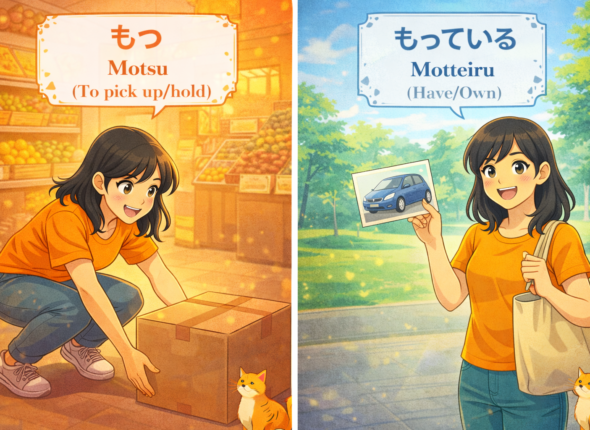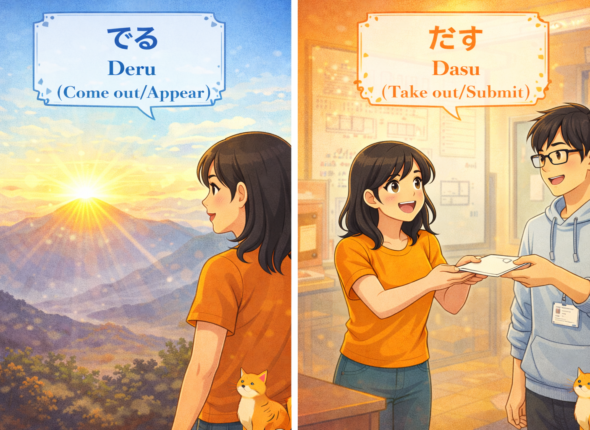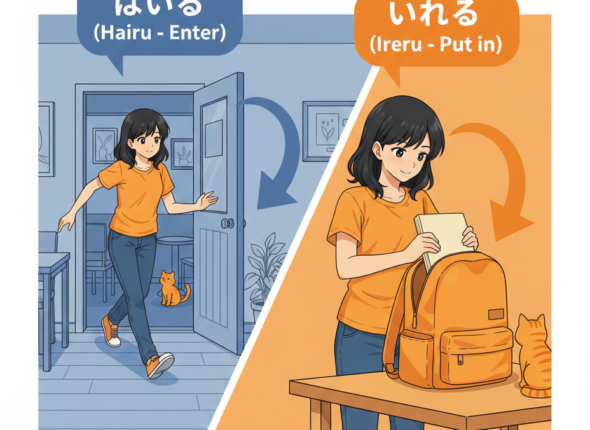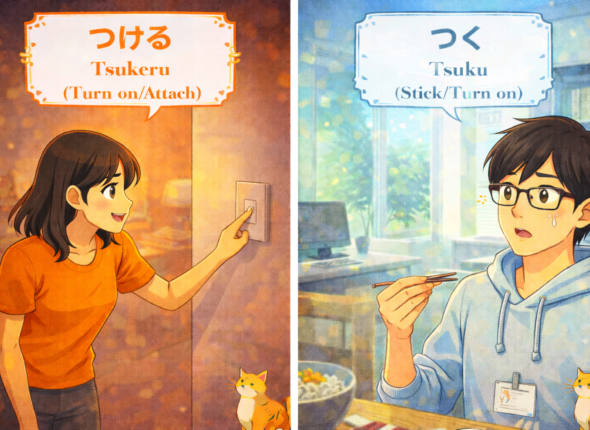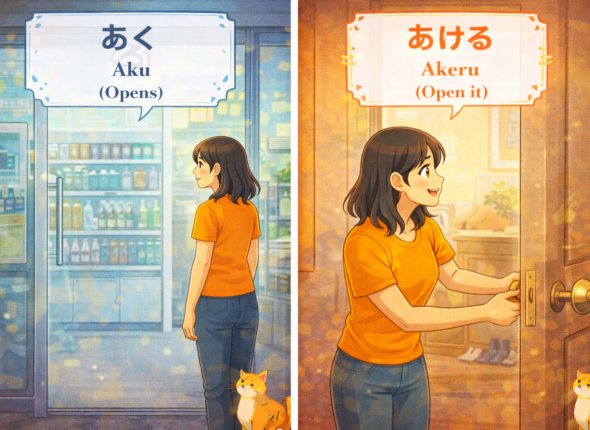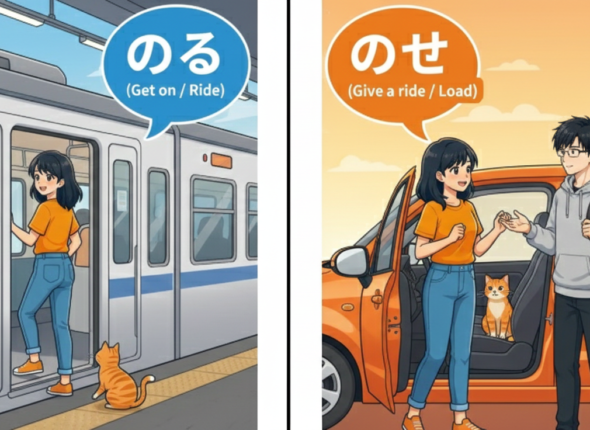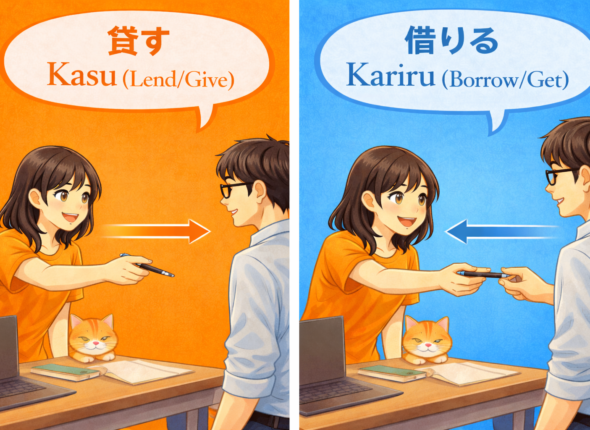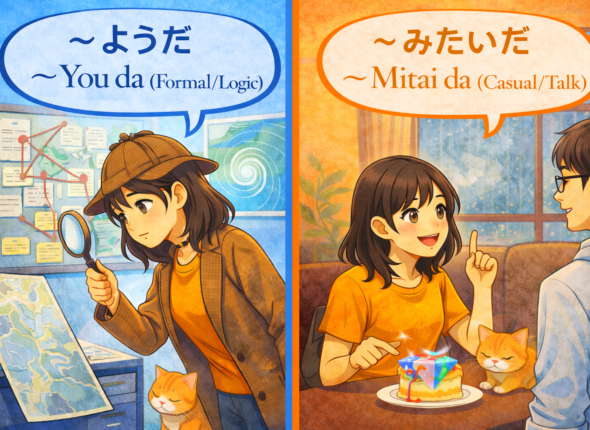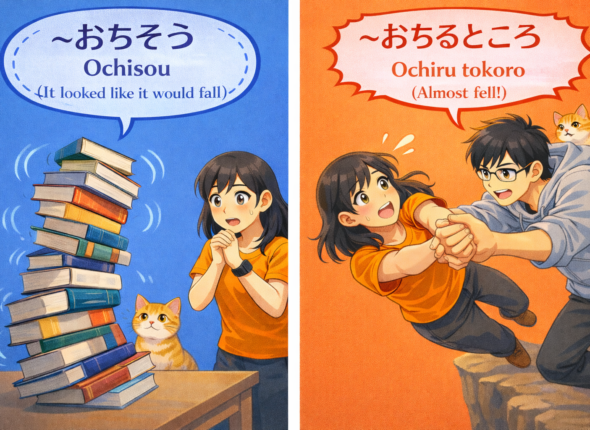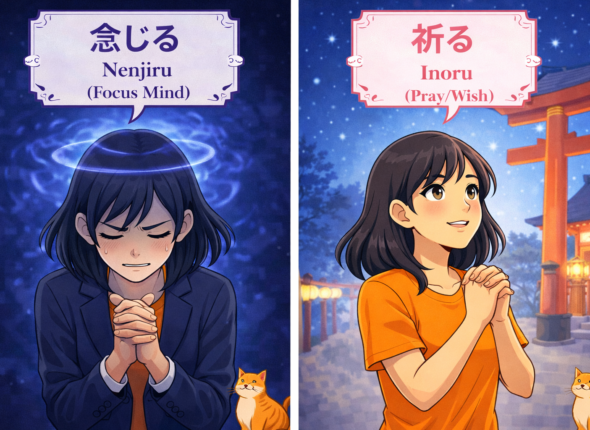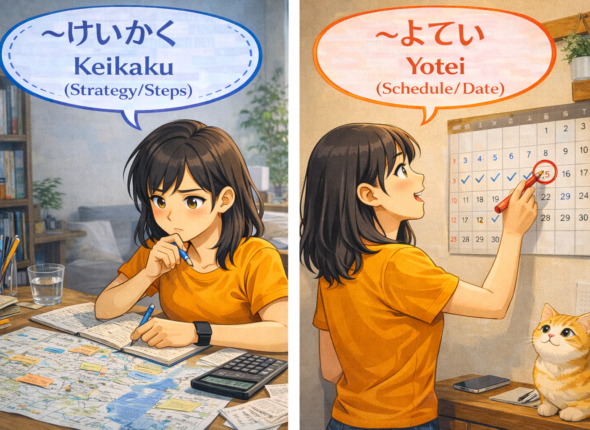The Difference Between 持つ (motsu) vs 持っている (motte iru)|Japanese Grammar (N5–N3)
(Joy picking up a box [Motsu] vs. Joy owning a car [Motteiru]) “I have a pen.” (Motteiru) “I will hold your bag.” (Motsu) In Japanese, 持つ (Motsu) is an instant action (to...
The Difference Between 出る (deru) vs 出す (dasu)|Japanese Grammar (N5–N3)
(Sun appearing [Deru] vs. Joy submitting homework [Dasu]) “The sun comes out.” (Hi ga deru) “I take out the trash.” (Gomi o dasu) They look similar, but 出る (Deru) is when something...
The Difference Between 入る (hairu) vs 入れる (ireru)|Japanese Grammar (N5–N3)
(Joy entering a room [Hairu] vs. Joy putting a book in a bag [Ireru]) “I enter the room.” vs. “I put the book in the bag.” They use the same Kanji (入),...
The Difference Between 付ける (tsukeru) vs 付く (tsuku)|Japanese Grammar (N5–N3)
(Joy turning on a light [Tsukeru] vs. Rice stuck on Ken’s face [Tsuku]) “I turn on the TV.” (Terebi o tsukeru) “The TV is on.” (Terebi ga tsuiteiru) One is an action...
The Difference Between 開く (aku) vs 開ける (akeru) |Japanese Grammar (N5–N3)
(Automatic door opening [Aku] vs. Joy opening a door [Akeru]) “The door opens.” (Doa ga aku) “I open the door.” (Doa o akeru) In English, the word “Open” is the same. But...
The Difference Between 乗る (noru) vs 乗せる (noseru)|Japanese Grammar (N5–N3)
(Joy riding a train [Noru] vs. Joy giving Ken a ride [Noseru]) “I ride the train.” (Densha ni noru) “I give my friend a ride.” (Tomodachi o noseru) In Japanese, 乗る (Noru)...
The Difference Between 見る (miru) vs 観る (miru) vs 見える (mieru) vs 見られる (mirareru)|Japanese Grammar (N5–N3)
(Joy seeing Mt. Fuji [Mieru] vs. Joy watching a movie [Miru/Kan]) “I see a bird.” (Mieru) “I watch a movie.” (Miru) “I can see (have a chance to see) the panda.” (Mirareru)...
Hear, Listen, or Ask? The Difference Between 聞く, 聴く, and 訊く (N3-N5)
Hear, Listen, or Ask? Understanding the Three Ways to Say “Kiku” in Japanese: 聞く, 聴く, and 訊く (N3-N5) You might know the Japanese verb きく (kiku), but did you know it can...
What’s the Difference? 貸す (kasu) vs. 借りる (kariru) – A Simple Guide to “Lend” and “Borrow”
(Joy lending a pen [Kasu] vs. Joy borrowing a pen [Kariru]) “Please borrow me a pen.” (Mistake!) “Please lend me a pen.” (Correct!) In Japanese, 貸す (Kasu) is to lend, and 借りる...
The Difference Between “ようだ” (you da) and “みたいだ” (mitai da)|Japanese Grammar (N5–N3)
(Detective Joy analyzing [You da] vs. Chatting Joy [Mitai da]) “It seems like it will rain.” 雨(あめ)が 降(ふ)る ようだ。 雨(あめ)が 降(ふ)る みたいだ。 Both sentences mean the same thing. But one sounds like...
How to Get the Best Out of Your Unlimited Access to Japanese Learning in JPLT Online School
How to Get the Best Out of Your Unlimited Access to Japanese Learning in JPLT Online School By JPLT DIALOG Plus | Published on October 23, 2025 Learn More, Speak More, and...
Student Roadmap: Beginner Level — Your First Step Toward Speaking Japanese Confidently
Student Roadmap: Beginner Level — Your First Step Toward Speaking Japanese Confidently By JPLT DIALOG Plus | Published on October 23, 2025 Discover the Joy of Learning Japanese Close your eyes for...
Let’s Learn About Japanese Festivals! Traditional Events and Culture
Let’s Learn About Japanese Festivals! Traditional Events and Culture Hello! Have you ever experienced a Japanese festival? Japan has many fun and exciting festivals to enjoy. This time, Eri-san, a staff member...
Enjoy Japan’s Four Seasons While Learning Japanese!
Enjoy Japan’s Four Seasons While Learning Japanese! Hello, everyone studying Japanese! Japan’s four seasons are characterized by beautiful nature, unique customs, and culture tailored to each season. In this post, Eri-san from...
What is the difference between “落ちそうだった” (ochisou datta) and “落ちるところだった” (ochiru tokoro datta)?
(Joy watching wobbling books [Ochisou] vs. Joy being saved from falling [Ochiru tokoro]) “The cup looked like it would fall.” (Ochisou datta) “I almost fell (but you saved me).” (Ochiru tokoro datta)...
Learn Japanese Through Gourmet! Master Japanese While Enjoying Delicious Food!
Learn Japanese Through Gourmet! Master Japanese While Enjoying Delicious Food! Hello everyone! Are you studying Japanese and interested in Japanese food culture? In fact, Japanese food is a very useful tool for...
“Nenjiru” vs “Inoru” – What’s the Difference?
(Joy using mental power [Nenjiru] vs. Joy praying to God [Inoru]) “I pray for peace.” (Heiwa o inoru) “I pray/chant silently.” (Kokoro de nenjiru) While both involve prayer, 祈る (Inoru) is asking...
The Difference Between “アンケートに回答する” and “アンケートを回答する”(Ankēto ni kaitō suru vs. Ankēto o kaitō suru)
The Difference Between “アンケートに回答する” and “アンケートを回答する” (Ankēto ni kaitō suru vs. Ankēto o kaitō suru) Aren’t “アンケートに回答する” (ankēto ni kaitō suru: to respond to a survey) and “アンケートを回答する” (ankēto o kaitō...
The Difference Between “道” (Michi), “通り” (Toori), and “道路” (Douro)
The Difference Between “道” (Michi), “通り” (Toori), and “道路” (Douro) Do “道” (Michi), “通り” (Toori), and “道路” (Douro) all mean the same thing?When should I use “道” (Michi), and when should I...
The Difference Between “計画する” (Keikaku Suru) and “予定する” (Yotei Suru)
(Joy making a detailed strategy [Keikaku] vs. Joy marking a calendar [Yotei]) “I plan to go to Japan.” Is it 計画 (Keikaku) or 予定 (Yotei)? In English, “Plan” covers both. But in...

